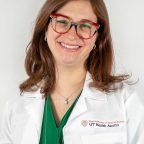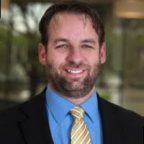Join us on this first of a two-part episode as we shadow Dr. Anna Capasso, medical oncologist and cancer researcher at the Livestrong Cancer Institutes. In this episode you’ll join Dr. Capasso as she meets with patients, discusses care plans with other physicians and navigates a typical day.
Dr. Anna Capasso is a Surgical Oncology Specialist in Austin, Texas. She graduated with honors in 2009. Having more than 11 years of diverse experiences, especially in surgical oncology, Dr. Anna Capasso affiliates with no hospital, cooperates with many other doctors and specialists in medical group Board Of Regents Of The University Of Texas System.
Guests
 Anna CapassoMedical Oncologist in Gastrointestinal Cancer at the Livestrong Cancer Institutes
Anna CapassoMedical Oncologist in Gastrointestinal Cancer at the Livestrong Cancer Institutes
Hosts
 Nick Smith-StanleyAssociate Director of Administration and Strategic Planning at the Livestrong Cancer Institutes
Nick Smith-StanleyAssociate Director of Administration and Strategic Planning at the Livestrong Cancer Institutes
ecause if it’s gonna be, like, a couple months for definitely you wanna control that local disease and avoid any possible spread or local spread that would make him un respectable. If we if we were gonna do additional systemic therapy, would you go back to the gym? If there’s no evidence of progression of disease, I would still play with the same player. You got it.
[0:17:34 Speaker 1] After meeting with Dr Fleming. It was time for Dr Capasso to return to the health transformation building to meet with her final patient of the day.
[0:17:43 Speaker 0] Hi. How are you? So I’m good to see you. Haven’t seen you in a while. How are you doing?
[0:17:49 Speaker 4] I’m doing well. Doing well. How are you doing?
[0:17:52 Speaker 0] Good. Thank you. So how are you feeling?
[0:17:54 Speaker 4] Feeling good? A little anxious, you know, meeting. But but physically feel, you know, feel good.
[0:18:02 Speaker 0] Okay. So I want to say that I have good news.
[0:18:05 Speaker 4] Okay. Good.
[0:18:06 Speaker 0] Yeah. So the c t. Actually, it’s showing overall the response on the lung. So some of the lesions that we were able to see in the lungs got very, like, smaller. So that actually is good news because it means that the treatment that we’re using its really working well on the lungs on the liver. Overall, it’s pretty stable.
[0:18:27 Speaker 4] Yeah, I feel good. The you know, the way this finally like it stabilized and it’s kind of stayed at the same level. And the last time we did away that, you know, it was actually a couple of pounds. So that’s good, you know? And, you know, yeah, there’s I feel like I get a little a little tired, you know, after the chemo, and I could definitely tell that it’s it gets a little bit harder each time, you know, in a little bit a little bit longer, to kind of get back to the point where I feel like I’m back to normal on DSO. That’s why it just feels like it. We also have a little break just to kind of catch up a little bit. Um, but yeah, I mean, I feel like I haven’t had any of the, you know, like throwing up or or any of the, you know, like the more significant side effects that that you know, we were prepared for, but yeah, I think that the treatment that he’s been getting are working. I mean, just from his physical ability is working really well, e I mean so much, you know, better than either of us had anticipated. You know, just when you hear about what you know what’s gonna happen. I think he’s been doing has been doing Grape hasn’t been like a really bad side effects or anything. So you’re tolerating well, very well. Yeah. Oh, yeah. Yeah. And I mean, the pain level is is almost insignificant. Well,
[0:19:55 Speaker 0] you have to think, Emily.
[0:19:57 Speaker 4] Yeah, there was one. There was one incident, like, right after the very first chemo with constipation and oh, my goodness, that was that was horrific. But, you know, and, you know, we didn’t know really what to expect. And so we thought, Oh, gosh. Is this what each of the key Moses gonna be like? Because it was It was the most painful thing I think I have ever experienced in my life and and come to find out it was most likely constipation. But, boy, that is e hope that makes it in the podcast.
[0:20:32 Speaker 0] We’re gonna We’re We’re gonna We’re gonna highlight that. And Nick is already writing a
[0:20:39 Speaker 4] note. So don’t worry, boy. But that is that’s really
[0:20:43 Speaker 0] I
[0:20:44 Speaker 1] noticed on the call that there are noticed during the G I huddle that there was a lot of discussion about the patient’s own goals, and the goals didn’t always have to do with clinical outcomes. So can you talk about that a little bit in? And how the clinical team really tries to focus on some of those non clinical goals and outcomes when when you’re coming up with a treatment
[0:21:08 Speaker 0] plan, the goals for patients not necessarily just curing cancer but also taking care of their body and their like them as people. So the really unique thing about our clinic in the SWAT team is that we can really sort of try to fulfill those needs. So we try to get together. And it’s not only the medical colleges, so it’s just not myself meeting with the patient. Usually I meet with them the very at the very beginning because we have a diagnosis and I have to tell them about that, and I have to tell them what that means and the severity what their life is gonna look like. But you know, really, I’m trying to treat their cancer. And unfortunately I said before, not always. I have the expertise or the time to discuss about other things that are so important during the cancer journey. So it’s really important for us to have other team members that are specialized in emotional support and pain medications and diet and fertility in order to really jump in and discuss with the patients what other needs are. Yeah, because the need can be to get a pill to sort of, like treat their cancer or cure their cancer. But that’s not gonna be all. So they’re gonna have other things that are going to go on during that cancer journey. And so it’s really important for us to be able to understand those from the very beginning. I believe one of the major goals for most of my patients is really maintain their quality of life or try to be able to do things that they normally do during their daily life. So being able to cook, being able to drive their kids to school, being able thio, goto work, continue their life, have their social, Um, you know, like life is well try to be able to meet with friends and feel good, even if they’re on chemotherapy. And unfortunately, like many other drugs, chemotherapy can give some side effects, and some of those side effects can make them very sick. And so we try to compensate, you know, with having all the team on board and try to discuss these from sort of day one with the patients so that we really know what the patient’s needs are. So
[0:23:10 Speaker 1] these are very difficult conversations that you’re having both with your colleagues and the patients and their families. How do you do it
[0:23:19 Speaker 0] generally have their very emotional person, and sometimes I think about it. And I feel like How can we really do this? And especially when you have to give that bad news to patients, and that’s really emotional for us. And so that’s why I feel like having such a great team that works with me, especially like having Angela and you know, like our cycle colleges, sometimes discussing with them the best way to approach our patient and really getting that sort of support from them helps me really a lot in my job. What I try to do in my job. I really try to show people that I really love my job and I do it because I really believe in what I do, and I really try to be there to help them. And so I really show them sort of my heart. It’s really emotional. I have to say I go back home sometimes and I, you know, I still think about the conversation I had and being a person, it’s like inedible. I think it’s just like normal, but that’s also the privilege that I think I have on my job. But that’s a privilege. The fact that you can check with people and even if they get mad at you are not or some of them really hug you and they’re really grateful for all you’ve been doing for them. But it’s a privilege for me to be able to really live that moment with them and being able to share with them that moment because thes air really unique and hard situation. So we should still be grateful for you know what we dio in our job.
[0:24:43 Speaker 1] I hope you enjoyed this brief look into the day in the life of a medical oncologist. I want to thank Dr Anna Capasso, her team and her patients for allowing me to spend the day with them to learn firsthand how the live strong cancer institutes is reinventing cancer care and research. Next week, we will release Part two of this episode, which features a conversation where we learn more about Dr Capasso, her research and her experiences as a woman and oncology, um, Nick Smith Stanley, with the live strong cancer institutes. And this has been cancer uncovered. For more information on the live strong cancer institutes, check out del med dot utexas dot e d u. You can follow our director on Twitter at S Gail Eckhart Eckhart is spelled e c k h a r D t. If you have questions or topics of ideas that we can uncover, email us at live strong cancer institutes at austin dot utexas dot e d u. Please make sure that institutes is plural, and if you liked our podcast, make sure you subscribe. This is cancer uncovered. Thank you for joining us.